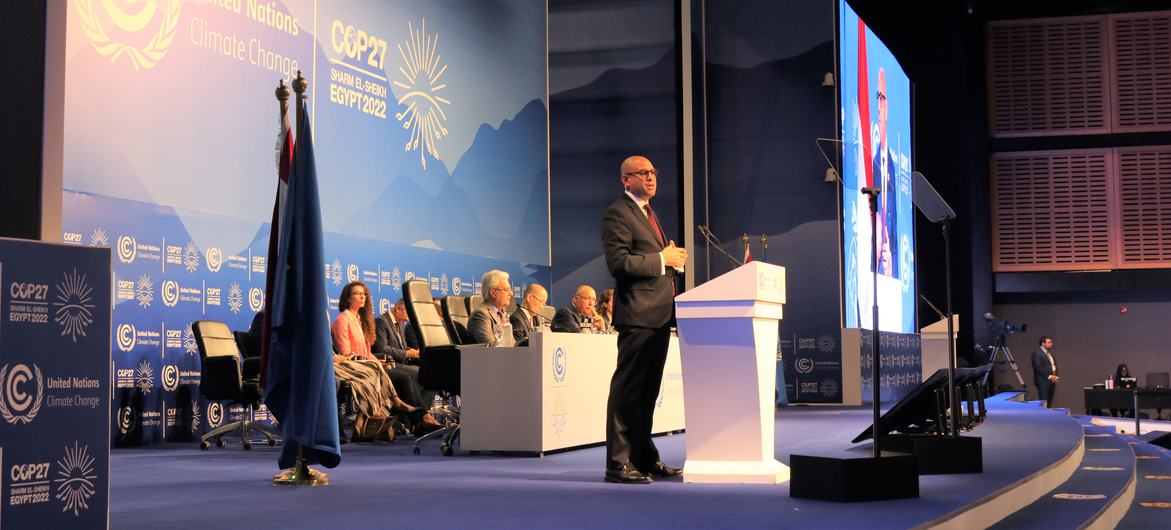We have distilled the outcomes relevant to companies on the road to net zero –– the most important developments, challenges, and opportunities for corporate decarbonisation.
We Mean Business Coalition signals “unwavering” climate commitment in the private sector
“We are committed to doing everything in our power to limit global warming to 1.5°C,” reads a declaration signed by over 200 company leaders. The We Mean Business Coalition, comprising some of the world’s largest businesses, scientists, and civil society leaders such as former Irish president Mary Robinson, doubled-down on commitments to avoid dangerous climate change and “catalyse business and policy action.”
As negotiations advanced in Egypt, the group called on national leaders to “demonstrate solidarity and decide where they stand” on a crisis that will disproportionately impact the world’s poorest. Citing the latest science and recent extreme weather events, the non-profit touted the success of the RE100 group and corporations with science-based targets, which “have collectively reduced their emissions by 29% between 2015 and 2020.”
The call to “move swiftly” towards climate goals was updated over the summit’s final week, endorsed by CDP, Climate Group and other organisations committed to driving their “shared vision at scale.” The move could see more businesses joining the initiative and putting more pressure on peers to take decisive action.
UN cracks down on weak net zero goals and corporate greenwashing
The High-Level Expert Group on Net Zero Emissions Commitments of Non-State Entities, a UN task force, unveiled a report that clamps down on weak climate promises in the public sector and outlines rules for credible corporate action.
The report titled 'Integrity Matters' puts forward ten key recommendations that build on the Science Based Targets initiative and UN's Race to Zero. The document outlines frameworks for short and long-term emissions targets, rules for carbon offsetting, and steps to increase transparency and accountability. It also defines activities that disqualify net zero claims, including lobbying against climate regulations.
Integrity Matters dovetails from the latest UN Net Zero Tracker report scrutinising corporate pledges across industries. The analysis showed little progress on credibility factors, including interim targets and Scope 3 emissions.

Simon Stiell, executive secretary of the UNFCCC, speaking at the opening ceremony of COP27.
Little progress on Article 6, the crux of carbon trading
Article 6 is the provision of the Paris Agreement governing carbon markets. While COP26 saw complementary rules written, COP27 was expected to deliver further progress towards transparency and governance to avoid obscure offsetting and double counting of carbon credits.
However, improvement was scant. New rules on internationally traded emissions outcomes (ITMOs), which countries can sell to each other, were considered a setback by observers as they permit nations to deem any information ––including crucial data for reporting emissions reduction–– confidential. The agreement raised eyebrows and sparked fears of greenwashing via secret carbon market deals.
Some progress was made to curb double counting through a new type of carbon credit known as “mitigation contribution,” which determines credits cannot be claimed simultaneously by a company and a country. The rule introduces new considerations for companies making offsetting claims, especially in countries that might use carbon credits towards their own climate goals.
Nations launch the Africa Carbon Markets Initiative to boost high-quality credits
COP27 saw the inauguration of the Africa Carbon Markets Initiative (ACMI), a coalition of nations that aims to transform the continent’s carbon market. The ACMI’s first seven members ––including Kenya, Malawi, Gabon, Nigeria, and Togo–– could potentially generate 300 million high-quality credits annually by 2030 and funnel 6 billion USD to support the African green transition.
The AICM aspires to support up to 110 million jobs by 2050. Moreover, the international group is already working with major buyers and financiers to set up advance commitments and mobilise 500 million USD towards developing 50MtCO2e, equivalent to the entire amount of credits Africa retired from 2010 to 2020.
Industry-led Planning for Climate Commission vows to speed the energy transition
International energy organisations have created the Planning for Climate Commission to help remove legal bottlenecks in the “approval processes for renewable energy projects.”
In many countries, renewable energy developers still face significant policy and legal obstacles. The newly founded group announced on the second week of COP27, will engage in multi-level work with governments, power producers, and local communities to accelerate licensing processes “in a transparent and comprehensive manner.”
Members of the Commission include the Global Wind Energy Council, Global Solar Council, International Hydropower Association and Green Hydrogen Association.
More nations join Global Methane Pledge, focusing on agriculture and waste
US Climate Envoy John Kerry announced the number of nations committed to reducing methane emissions by 30% this decade had increased to 150 from just above 100 at the start of the summit. Newcomers include Egypt, Qatar, Austria, and Australia, while China, Russia, and India still decided not to sign.
To tackle the potent greenhouse gas, the Global Methane Pledge has launched new pathways for agriculture, responsible for almost 140 million tonnes annually, and waste, which accounts for about a fifth of all anthropogenic methane. The recommendations aim to help businesses and governments reduce methane outputs and channel investments into improved farming systems, biodigesters, and other technology.
Simultaneously, the UN Environment Programme’s International Methane Emissions Observatory will launch a new satellite system to identify methane hotspots and give companies and states better tools for action.


.png?width=3840&height=2560&name=Sun(1).png)

.png?width=3840&height=2560&name=Landscape_2(1).png)





